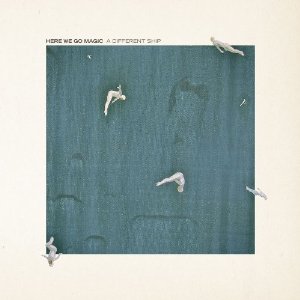In an age where bands rush to get their first noteworthy ideas out into the public domain before they’ve even played a gig, and have shot their creative load by the time their debut album hits stores, it’s good to see a group taking time to work out their strengths and weaknesses and develop their sound. In 2009 Luke Temple – a Brooklynite with a pair of folky solo albums to his name – adopted the moniker Here We Go Magic and put out an eponymous LP of hazy, 4-track recorded ambient pop and psychedelic white noise spun from looped guitars and layered synths that, despite being pleasant enough in an unassumingly lo-fi kind of way, failed to leave any real lasting impression.
Released just a year later, follow-up Pigeons sounded like the work of a different group altogether, which – to all intents and purposes – it was. Reborn as a fully operational five-piece, Temple’s bedroom project suddenly had legs and wouldn’t stop kicking; previously the product of FX-pedals and samplers, new songs were built around a more organic form of repetition, with the band taking hooks and jamming them enthusiastically to within an inch of their lives, giving new-wave pop gems like ‘Hibernation’ and ‘Collector’ a tranced-out Krautrocking feel. It’s no wonder that after playing at that year’s Glastonbury the band found themselves with one new high-profile fan in the shape of Radiohead front-man Thom Yorke, who spent the whole set dancing like a loon with longtime studio ally Nigel Godrich.
It was a serendipitous post-gig meeting with the pair that planted the seeds of HWGM’s third album, A Different Ship. Godrich offered his services, and the group understandably bit off his hand, with the resulting collection highlighting what a fantastic difference the right combination of band and producer can make. Here Godrich applies similar polish to that he deployed on his work with Radiohead, sealing the group’s sound in an airtight bubble and then piping in magical hallucinogenic gases (okay, maybe not) that make the keyboards resemble alien transmissions and the guitars sound like they were recorded underwater. Fifteen years after OK Computer, it remains an effective trick, and one that dovetails nicely with the album’s recurring themes of unresolved tension and the conflicting desire for personal space and emotional – and physical – connection. On the one hand, it’s almost claustrophobically intimate, single bass notes filling a room and Temple’s vocals so closely mic’d they feel like a whisper in your ear; on the other it’s other-worldly, tantalisingly familiar and yet just a little off, like dropping a stone in a well and seeing your own rippling reflection in the murky water at the bottom.
Just occasionally, it’s hard to separate the producer’s input from the actual songs; ‘Over The Ocean’ and ‘Miracle Of Mary’ are basically mood pieces, near-ambient swathes of sound that, stripped of studio sheen, would doubtless drift aimlessly, while the doomy, detached ‘Alone But Moving’ – all choirboy falsettos and mogadon-heavy piano chords – sounds like an attempt at recreating the stereotypical Radiohead ballad sound. No bad thing, admittedly, but it’s when HWGM choose to use their own voice that their words echo longest. Opener ‘Hard To Be Close’ starts off as a loose country-skiffle strum-along before crystalline guitar washes, Technicolor synth bursts and a taut martial groove push the song into Krautrock territory; ‘Make Up Your Mind’ and ‘Made To Be Old’ both expand on Pigeons‘ quirky pop sound, marrying scratchy post-punk guitars and see-sawing bass-lines to galloping drums and percussive multi-part backing vocals. ‘I Believe In Action’ introduces programmed rhythms, its rough-edged electro-funk beats playfully at odds with Temple’s gentle sighs. Best of the bunch, though, is ‘How Do I Know’, a single droning chord jammed out against throbbing bass and hypnotic, metronomic drums that builds and builds despite its stripped-back minimalism. It recalls the jubilant simplicity of songs like ‘Roadrunner’ or ‘Teenage Kicks’. The track’s limitless replay value is indicative of the album as a whole, and with new details revealed with each subsequent listen A Different Ship is another exciting chapter in the story of a band who continue to improve with every release.


